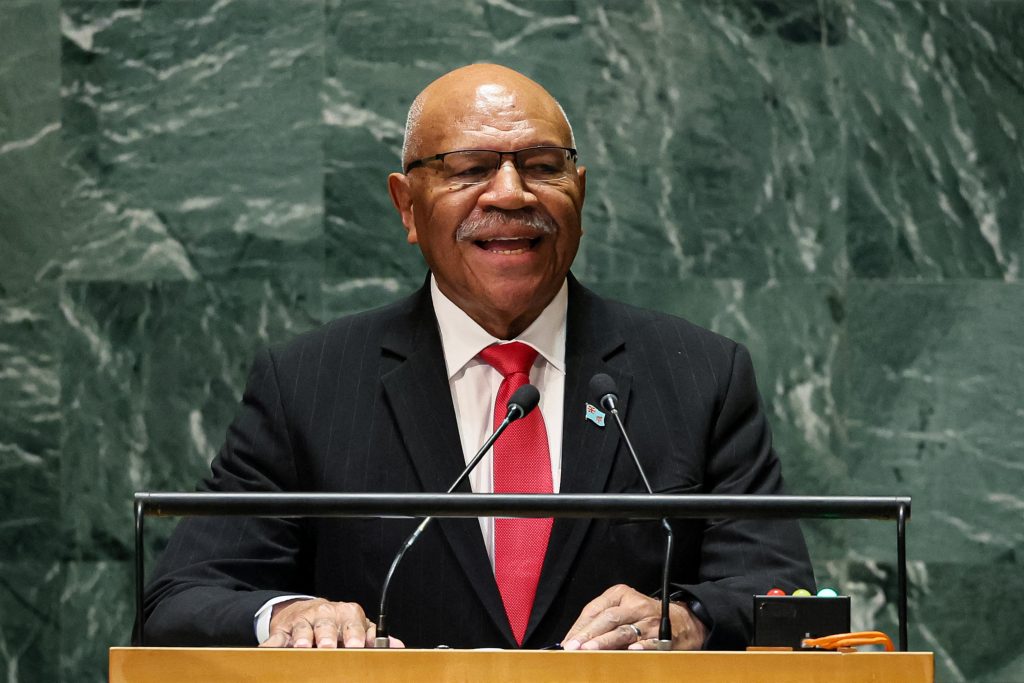New Year’s Day marked a significant milestone for Fijian Prime Minister Sitiveni Rabuka’s three-party coalition government. It exceeded the longest term in office for any Fijian government installed by the peaceful transfer of power. But crossing this notable threshold does not guarantee another year in office. Sentiment that the last election did not produce the expected change will continue to test Fiji’s political and democratic institutions in 2024.
The key looming challenge for Rabuka is holding together the fragile marriage of convenience brokered in late December 2022. His People’s Alliance (PA) party was not the largest party and needed both minor parties to scrape together the barest of parliamentary majorities.
The former main opposition party, the Social Democratic Party (SODELPA), agreed to join by the narrowest vote of the party executive. Bad blood stemmed from the origins of Rabuka’s PA. Rabuka, who had once led SODELPA, took a substantial share of its membership to form his new party.
The National Federation Party (NFP), Fiji’s oldest continuous party, has suffered its own frustrations in the coalition. Its membership base is still largely Indo-Fijian, reflecting its origins in the old independence politics of ethnic communalism. The sacking of SODELPA’s Aseri Radrodro from the ministry and impending disciplinary action against PA minister Lynda Tabuya emerged early in 2024 as threats to coalition unity.
As much as the coalition parties have suffered internal and cross-party tensions, the opposition FijiFirst party has scarcely fared better, losing both members of its founding leadership during the year.
Former prime minister Frank Bainimarama surrendered his role as opposition leader when he resigned his parliamentary seat in March after being suspended for sedition. Although later acquitted of a criminal charge of perverting the course of justice in October, the case has gone to appeal in 2024.
FijiFirst’s general secretary and powerful attorney general in the Bainimarama government, Aiyaz Sayed-Khaiyum, also faced criminal charges for abuse of office, which have had to be delayed due to health problems. Citing these medical issues, Sayed-Khaiyum resigned from his party post in December.
One indicator that serious centrifugal pressures were pulling at coalition cohesion appeared towards the end of 2023 with rumours of an early general election in late June 2024, but this fear may prove optimistic. If the current partisan travails are navigated, the local government elections due sometime in 2024 will offer a critical test for how all the political parties are travelling.
The Bainimarama government was dismissive of local governance, in part because the 2005 local government elections only had a turnout of 31 per cent. But many Fijians welcomed the coalition’s November 2023 amendment of the 1972 Local Government Act to restore local control of councils through elected officials, seeing this as fully completing Fiji’s return to democracy.
The precise contours of the new local government system are still incomplete, but all political parties will have to decide whether to contest these elections and, if they do, how vigorously. There are risks whatever they decide.
Failure to achieve expected results could weaken a party’s chances in the general election. Yet ‘hiding’ from the electorate looks like self-doubt. On the other hand, success in the local elections could help to develop regionalised support or give small parties a national profile.
Dissecting and analysing the entrails of Fiji’s party politics at both the national and local levels will continue to absorb much of the attention of observers, but there are other carry-over concerns from 2023 regarding Fiji’s democratic and constitutional stability.
One symptom of this was that suspicions about the military’s possible intervention in politics persisted throughout the past year. These spanned from a pushback on public comments in January 2023 by the Republic of Fiji Military Forces (RFMF) Commander Major General Ro Jone Kalouniwai. This was achieved through a May attempt to link the questionable exclusion of the entire opposition from parliament to the military and a cancelled cabinet reshuffle due to RFMF constitutional concerns and suspicions regarding alleged delays in Rabuka’s visit to the Queen Elizabeth Barracks army base in December.
Whatever substance there might have been in these and other incidents that set social media atwitter, the relationship between the unflappably measured Home Affairs Minister Pio Tikoduadua and the politically sensitive RFMF Commander Kalouniwai appears to have strengthened since the transfer of power in December 2022.
There are points of tension between them, particularly about the meaning of Section 131 of the Constitution. The RFMF believes that this section confers some form of supra-constitutional authority to act against a government behaving badly, while Tikoduadua argues it does not.
Rabuka, motivated by the strong Zionist strand in his conservative Christian beliefs, has pushed back some ire from the RFMF for his overly pro-Israeli stance. It is feared that the opening of an embassy in Jerusalem and vote against a ceasefire in Gaza could damage Fiji’s position with the United Nations as a trusted Middle East peacekeeper. Israel has offered financial assistance to induce Papua New Guinea to establish a mission in Jerusalem.
Forging a shared view on this and other issues regarding the RFMF and government security objectives will be the subject of a national security and defence review announced by Home Affairs Minister Tikoduadua in mid-December. The review is supported by Commander Kalouniwai who said that the review is ‘very appropriate’.
Constitutional change is another area of potential stress in 2024 as Attorney General Siromi Turaga has signalled that the Government wants to find ways to revise the 2013 constitution without going through its near-impossible amendment process.
Richard Herr teaches a Parliamentary Law, Practice and Procedure course at the Faculty of Law of the University of Tasmania and is former Adjunct Professor of Governance and Ethics, Fiji National University.
This article is part of an EAF special feature series on 2023 in review and the year ahead.

